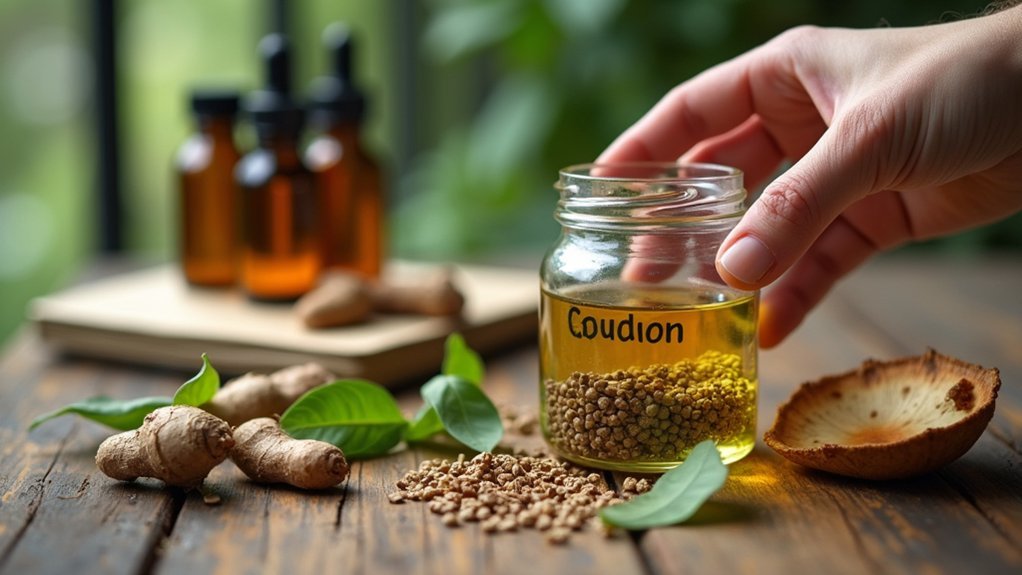Are you feeling overwhelmed by constant stress and searching for natural solutions? Adaptogens might be your secret weapon in managing daily tension and supporting your body’s resilience. These powerful herbal compounds work with your system to balance stress responses, potentially offering a gentler alternative to traditional treatments. But before you jump in, there’s essential safety information you’ll want to understand. Navigate this herbal landscape wisely, and you could discover a transformative approach to wellness that goes beyond typical stress management techniques.
Key Takeaways
- Consult a healthcare professional before starting any adaptogenic supplement regimen to assess individual health risks and potential medication interactions.
- Choose high-quality, third-party tested adaptogenic supplements from reputable sources to ensure purity, potency, and minimize potential contamination risks.
- Start with low dosages and carefully monitor your body’s response, noting any side effects or unexpected changes in stress levels or overall health.
- Recognize that adaptogens are complementary to, not replacements for, standard medical care and comprehensive stress management strategies.
- Be aware of specific contraindications, especially for individuals with hormone-sensitive conditions, pregnant women, children, and those with pre-existing medical conditions.
What Are Adaptogens and How Do They Work?

While stress has become an increasingly common challenge in modern life, adaptogens offer a natural approach to managing physiological and mental strain. These powerful herbs and fungi work with your body’s stress response, helping to regulate cortisol levels and support your immune system. Key adaptogens like ashwagandha, rhodiola, and ginseng interact with the hypothalamic-pituitary-adrenal (HPA) axis, promoting resilience and balance during challenging times. Research suggests these natural substances can help you adapt more effectively to physical, emotional, and environmental stressors. By modulating your body’s stress response, adaptogens don’t just mask symptoms but help restore overall homeostasis. The health benefits extend beyond stress management, potentially improving energy, mental clarity, and overall well-being. While promising, ongoing research continues to explore the full potential of these remarkable natural compounds.
Top Adaptogenic Herbs for Stress Management

The modern stress epidemic demands natural, holistic solutions—enter adaptogenic herbs. When you’re seeking effective stress management, ashwagandha offers powerful anxiety reduction and hormonal balance. Rhodiola rosea emerges as a top choice for combating fatigue and enhancing mental performance during challenging times. Panax ginseng delivers energy-boosting benefits that combat both physical and mental exhaustion, while Holy basil supports immune function and mood stabilization. Eleuthero stands out for improving physical endurance in high-stress environments.
These adaptogen supplements work synergistically to help you navigate life’s pressures. By targeting your body’s stress response, they provide natural support without harsh side effects. Whether you’re facing workplace challenges, personal struggles, or simply need resilience, these herbs can be your botanical allies in maintaining wellness and equilibrium.
Understanding the Science Behind Adaptogens

As science explores deeper into stress management, adaptogens emerge as fascinating natural compounds that offer more than just temporary relief. These non-toxic herbs and mushrooms work by regulating the hypothalamic-pituitary-adrenal (HPA) axis, helping you modulate cortisol levels and manage stress more effectively. Substances like ashwagandha and rhodiola rosea interact with your body’s general adaptation syndrome, prolonging resistance to stressors and preventing burnout. By supporting your immune function and hormonal balance, adaptogens enhance mental performance and provide a holistic approach to stress relief. Their unique ability to promote homeostasis means you’re not just masking symptoms, but addressing the root of stress at a biochemical level. Research continues to reveal the profound ways these natural compounds can support your body’s resilience and overall well-being.
Potential Benefits and Limitations

Although traditional medicine has long recognized the power of natural remedies, modern scientific research is now illuminating the nuanced potential of adaptogenic herbs in stress relief. Adaptogens like ashwagandha and rhodiola offer promising benefits for managing anxiety and enhancing mental performance, but they’re not a one-size-fits-all solution. Your individual responses to these herbs can vary considerably, making consulting a healthcare provider essential before incorporation.
While these natural supplements may help alleviate stress, they come with potential side effects and limitations. They shouldn’t replace traditional medical treatments but can complement existing strategies. Understanding the benefits and potential risks is vital. By approaching adaptogens with informed caution and professional guidance, you can explore their potential as part of a holistic approach to managing stress and supporting overall well-being.
Safety Considerations and Precautions

While steering through the world of adaptogenic herbs, prioritizing safety becomes vital for anyone considering these natural stress-relief supplements. Your journey with adaptogens requires careful navigation:
- Consult your healthcare provider before starting, especially if you’re managing medical conditions or taking medications.
- Select high-quality supplements with third-party testing to help guarantee potency and purity.
- Monitor your body’s response and potential side effects when introducing new adaptogens.
Understanding potential interactions and individual sensitivities is essential. Not all adaptogens suit everyone, particularly those with hormone-sensitive or autoimmune conditions. Remember, these supplements complement—but don’t replace—standard medical care. Approach adaptogenic herbs with an evidence-based, holistic mindset, recognizing they’re supportive tools for stress relief, not miracle solutions. Your health and safety should always be the primary consideration.
How to Choose Quality Adaptogenic Supplements
How can you guarantee the adaptogenic supplements you’re choosing are genuinely high-quality and effective? Start by seeking standardized extracts that ascertain consistent potency across different brands. Always read product labels carefully to identify specific adaptogens, their concentration, and additional ingredients that might impact safety and efficacy.
Research the manufacturer’s reputation and prioritize supplements with third-party testing verification. Look for certifications like organic or non-GMO that align with your health preferences. Reputable brands often provide transparent information about their product sourcing and quality standards.
Before starting any new supplement regimen, consult your healthcare provider. They can recommend appropriate dosages tailored to your individual health needs and help you navigate potential interactions with existing medications, guaranteeing you’re selecting the most suitable adaptogenic supplements for your wellness journey.
Interactions With Medications and Health Conditions
Since adaptogenic herbs can profoundly interact with various medications and health conditions, it’s crucial to approach their use with informed caution. When considering adaptogens like ashwagandha and ginseng, you’ll want to be aware of potential interactions:
- Medications affecting blood pressure, blood sugar, and thyroid function may be greatly impacted by adaptogen consumption.
- Hormone-sensitive conditions require careful evaluation before using these herbal supplements.
- Limited safety data exists for specific populations, including pregnant women, children, and elderly individuals.
Always consult a healthcare provider before incorporating adaptogens into your wellness routine. The lack of FDA regulation means supplement quality can vary, potentially leading to unexpected interactions. Your safety depends on thorough understanding and professional guidance when exploring these natural stress-relief options.
Incorporating Adaptogens Into Your Wellness Routine
After carefully considering potential medication interactions and health risks, you’re ready to explore integrating adaptogens into a balanced wellness approach. Start by consulting your healthcare provider to determine appropriate dosages and potential interactions with existing medications. Begin with low doses of herbal supplements like ashwagandha or rhodiola, gradually increasing as your body adapts.
| Adaptogen | Stress Relief | Wellness Benefit |
|---|---|---|
| Ashwagandha | Anxiety reduction | Emotional balance |
| Rhodiola | Fatigue alleviation | Energy support |
| Ginseng | Mental clarity | Cognitive function |
| Holy Basil | Stress management | Holistic balance |
Consistency is essential in experiencing stress relief benefits. Incorporate adaptogens through teas, powders, or capsules, monitoring your body’s response and adjusting your routine as needed. Remember, adaptogens work best when complemented by a thorough approach to managing stress and maintaining overall wellness.
Frequently Asked Questions
What Is the Best Adaptogen for Stress?
You’ll find Ashwagandha best for stress relief, offering remarkable benefits like lowering cortisol, enhancing mental clarity, and balancing hormones. Rhodiola Rosea and Holy Basil are strong alternatives, but Ashwagandha stands out for extensive stress reduction and energy support.
Are Adaptogenic Herbs Safe?
Ironically, nature’s “safe” herbs aren’t entirely risk-free. You’ll want to consult healthcare professionals, consider individual responses, and source high-quality adaptogens while monitoring dosage and potential interactions—especially during pregnancy or with existing health conditions.
Are Adaptogens Regulated by the FDA?
No, adaptogens aren’t FDA-regulated. You’ll find herbal supplements lack rigorous safety standards, with minimal market oversight. This means you can’t rely on guaranteed quality assurance or proven efficacy without independent testing and professional guidance.
What Are the Negatives of Adaptogens?
“Better safe than sorry” when exploring adaptogens. Potential side effects include allergic reactions, herb interactions, and individual variations. Consult healthcare professionals, follow dosage recommendations, and be aware of long-term use risks before incorporating these supplements.
Conclusion
Your journey with adaptogens isn’t just about stress relief—it’s about nurturing your body’s resilience. By choosing high-quality, carefully sourced herbs and consulting healthcare professionals, you’ll navigate wellness with wisdom. Remember, these botanical allies aren’t magic bullets, but gentle companions supporting your body’s natural ability to dance with life’s challenges. Embrace adaptogens as part of a holistic approach, listening to your body’s unique wisdom.



